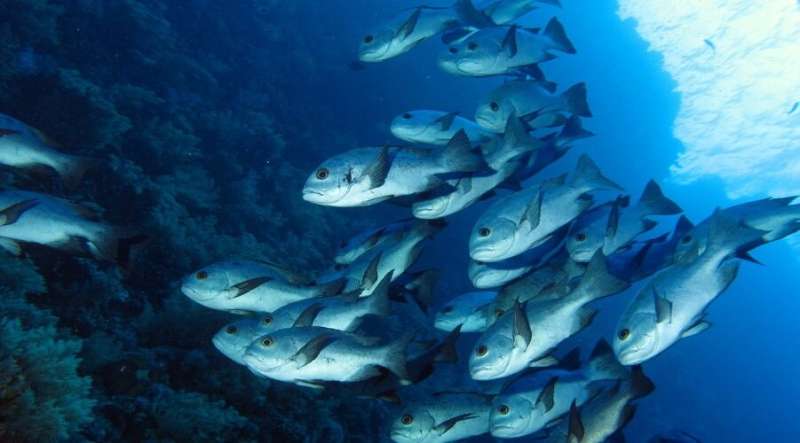How warmer waters from climate change affect biochemistry and growth of fish

Warmer water than that to which a fish is accustomed becomes an aggressor of sorts that impacts internal biochemical processes and forces the fish to stop growing at a smaller size than it would normally do in optimal habitat conditions, new research shows.
In a recent paper published in the journal Environmental Biology of Fishes, researchers at the University of British Columbia’s Sea Around Us initiative and the University of Bergen explain how a process called “protein denaturation” intensifies when the waters in which fish live heat up.
Protein denaturation takes place when proteins, which are essential components of living organisms’ cells and tissues, lose their original structure as a consequence of disruptions to the weak links that maintain their complex shapes—a common, spontaneous occurrence in most living organisms.
One of the causes of such disruptions is heat, which increases the movement of water and protein molecules within cells, makes them bump against each other and results in the proteins losing their shape. The warmer the surrounding environment, the stronger the shocks and the more proteins lose their shapes. This is the “denaturation” process.
Proteins that have lost their shape do not fulfill their assigned role and, therefore, need to be resynthesized, so that the organism doesn’t fall apart.
“As fish grow, more proteins are denatured. When the rates of denaturation and synthesis of new proteins become equal, then they stop growing,” said Dr. Daniel Pauly, lead author of the study and principal investigator of the Sea Around Us. “The issue is that when their surrounding water is warmer than usual, the process of creating new proteins cannot keep up with the accelerated rate of denaturation caused by heat so fish have no other choice but to stop growing so that both processes can balance each other out.”
The process of resynthesizing proteins accelerates fish’s metabolism and, thus, they need more oxygen to sustain their body functions. Oxygen is key for the production of ATP and new proteins. The problem is that warmer waters contain less oxygen.
“So, basically, fish are gasping for ‘air’ to be able to maintain their bodily functions but there is little oxygen available,” Pauly said.
In addition to this, fish obtain oxygen through their gills, which are two-dimensional surfaces working for three-dimensional bodies. This means that gills, in general, cannot keep up with a growing 3D body.
“If gills are already not keeping up and you add warmer, less oxygenated water plus accelerated metabolism, fish must remain smaller in order to survive,” Pauly said. “Knowing all of this is crucial for biologists wanting to understand the adverse consequences of climate change for marine and freshwater biodiversity.”
More information:
Daniel Pauly et al, Too hot or too cold: the biochemical basis of temperature-size rules for fish and other ectotherms, Environmental Biology of Fishes (2023). DOI: 10.1007/s10641-023-01429-7
Citation:
How warmer waters from climate change affect biochemistry and growth of fish (2023, June 28)
retrieved 28 June 2023
from https://phys.org/news/2023-06-warmer-climate-affect-biochemistry-growth.html
This document is subject to copyright. Apart from any fair dealing for the purpose of private study or research, no
part may be reproduced without the written permission. The content is provided for information purposes only.
For all the latest Science News Click Here
For the latest news and updates, follow us on Google News.

